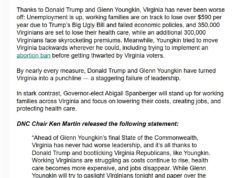Back in 2006, as many of you know, I was one of the co-founders of a group that attempted to persuade former Reagan Administration Navy Secretary, Democrat-turned-Republican-turned-Democrat Jim Webb, to run for U.S. Senate from Virginia. In the end, as described in detail in Netroots Rising, we were successful — both in persuading Webb to seek the Democratic nomination and in helping him win both the nomination and general election against George Allen (in the process, tipping the U.S. Senate to Democratic control). I’ll always be proud of the Draft James Webb movement, even if at this point Webb has gone completely off what he used to call the “right-wing deep end.”
The reason I raise this now is because we’ve got a candidate seeking the Democratic nomination (and just named to the DCCC’s “Red-to-Blue” list) in VA-02, Elaine Luria, who voted for Republican Scott Taylor both in the 2016 GOP primary AND in the 2016 general election against the Democratic nominee in VA-02. According to Patrick Wilson’s report in the RTD (bolding added by me for emphasis):
She has the blessing of the party elite in Washington. One thing not on her résumé: She voted for Taylor in a Republican primary in 2016 and again in the November general election, when Taylor defeated Democrat Shaun Brown to win the seat.
“Elaine doesn’t make decisions just based on political party,” her campaign manager said by email. “Faced with the options on the ballot, she took a chance on fellow veteran Scott Taylor who promised to bring change and be something different, but he broke those promises.”
Taylor, a former state lawmaker and Navy SEAL, ran for the open seat in 2016 after former GOP Rep. Scott Rigell opted not to seek re-election. Taylor beat U.S. Rep. Randy Forbes in a primary.
[…]
“Like many Democrats in our district, Elaine voted against Randy Forbes in that primary because he had shown during his legislative career to be an extreme voice in Congress, particularly when it came to women’s reproductive freedom, LGBT equality, and preventing gun violence,” Luria campaign manager Kathryn Sorenson said by email.
“Now, after seeing the way that Scott Taylor has acted in Washington and the votes he has taken to create chaos in our health care system, Elaine has decided to run against him.”
Back in January, I had actually asked Luria about her vote in the GOP primary, and she responded: “That year, there was no Democratic primary for Congress and I wanted to have my voice heard on who was on the ballot.” I responded to her that “I would have voted for Mickey Mouse or something in that one.” I haven’t heard a word from her since. LOL
At this point, I haven’t chosen a candidate in VA-02, but it’s been between Luria and Karen Mallard, the only two serious contenders for the Democratic nomination, as far as I’m concerned. But I’ve got to say, the news about Luria voting for Taylor really bugs me, for at least three reasons.
First off, I think that Taylor is going to have a field day with this. Already, Taylor’s spokesperson is responding gleefully to the RTD, “Scott Taylor is the same guy he was in 2016 and has done everything he said he would on the campaign. The only reason Luria is running is because she was promised money by Nancy Pelosi to be another rubber stamp in D.C. The people of the 2nd district will see right through it.” Expect to hear a LOT of that type of language in coming months, and certainly if Elaine Luria becomes the Democratic nominee in VA-02. So yeah, I truly do not see how this will help Luria win the general election. To the contrary, I think it will hurt her that she voted not once but twice for the same guy she voted for less than two years ago.
Second, it’s bad enough to have voted Republican back in the 1980s – or, as Ralph Northam did, to reelect the godawful George W. Bush in 2004 (!) – but at this point, the Republican Party is exactly what Thomas Mann and Norm Ornstein described in their landmark 2012 article — “an insurgent outlier in American politics…ideologically extreme; scornful of compromise; unmoved by conventional understanding of facts, evidence and science; and dismissive of the legitimacy of its political opposition.” As Mann and Ornstein further noted, “When one party moves this far from the mainstream, it makes it nearly impossible for the political system to deal constructively with the country’s challenges.” So how can any Democrat – or anyone who cares about democracy, facts, science, truth, climate change, environmental protection more broadly, gun violence prevention, a woman’s right to choose, LGBT equality, civil rights, voting rights, you name it – vote for the “insurgent outlier” party at this point? And sure, sometimes the Democratic candidate on the ballot isn’t someone you want to vote for, but nobody’s forcing you to vote in that race at all. Or, if you REALLY want to vote in that race, nobody’s stopping you from writing in someone else. I really don’t get why Luria couldn’t have done either of those things in 2016.
Last but not least, if you believe the key to winning elections during the Trump presidency is to motivate the Democratic base, then I certainly don’t think nominating people who voted Republican as recently as 2016 is the way to go about that. If, on the other hand, you think winning elections in 2018 is mainly about persuading Republican voters, then I guess nominating a recent Republican voter fits your “theory of the case.” But it definitely doesn’t fit mine.
So the bottom line for me is that, in the past, I’ve been all about – as Jim Webb liked to say – seeking out converts (to the Democratic Party) rather than “heretics to burn at the stake.” Of course, with Webb, my first question to him when we met in December 2005 was why someone who had worked for Reagan (as Navy Secretary, no less) had decided to become a Democrat. The response was, as I recall it, a 20-minute-or-so discourse on the history and evolution of the Republican and Democratic parties, how the Democrats were the only hope for working people, how the health of a society needs to be measured at its base and not at its apex, how the GOP had gone “off the right-wing deep end,” etc.
So that’s my “Jim Webb test” for Democratic candidates who used to vote Republican: can you explain, articulately and convincingly, why you used to vote Republican (or even serve in a Republican administration) but are now a Democrat? Regarding Elaine Luria, she very well might have such a case to make, but so far I haven’t heard it. To the contrary, I’ve mostly heard about how she doesn’t vote based on party (whatever that means, given the stark differences between Democrats and the Party of Sarah Palin, Ken Cuccinelli, Corey Stewart, E.W. Jackson, Donald Trump, etc., etc.), how Taylor supposedly wasn’t what she expected him to be, etc.
On that latter point, my friend Josh Stanfield of Activate Virginia posted on his group’s Facebook page this morning something that rings true to me: “Scott Taylor was a member of the House of Delegates and had a partisan voting record in that body. When he ran for Congress in 2016, anyone interested in his politics or voting behavior would’ve been just a few clicks away from discovering his opposition to pretty much every Democratic priority.”
So, bottom line, the answer to the question I posed in the headline is that it’s hard for me to imagine any real Democrat voting for a Republican for federal office* at this point – or really at any point at least since the Tea Party movement reared its hideous head back in 2009. Of course, there can be extenuating circumstances that might – in very rare cases that are hard for me to imagine – justify a Democrat having voted Republican for federal office since the Tea Party, or even since Bush/Cheney or Gingrich in 1994. But there had better be a damn good explanation for doing so if they want my support going forward, that’s all I have to say.
*Note: I’m specifying federal office because I think it’s still at least theoretically possible, at the local level and POSSIBLY state level to have a reasonable, non-extreme Republican (e.g., the GOP governor of Massachusetts? the GOP governor of Vermont?). Plus, voting Republican at the federal level means voting for control of Congress, so even if you like Republican X, voting for him or her effectively means voting for Speaker Ryan and/or Majority Leader McConnell, and that’s completely unacceptable.




![Sunday News: “Trump Is Briefed on Options for Striking Iran as Protests Continue”; “Trump and Vance Are Fanning the Flames. Again”; “Shooting death of [Renee Good] matters to all of us”; “Fascism or freedom? The choice is yours”](https://bluevirginia.us/wp-content/uploads/2026/01/montage011126-238x178.jpg)






